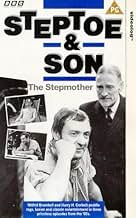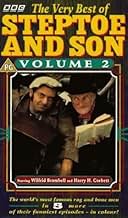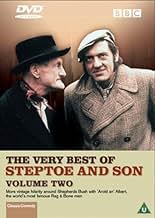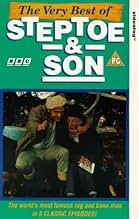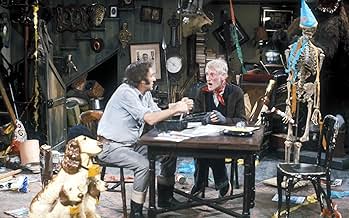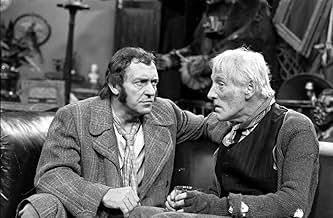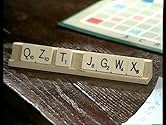AVALIAÇÃO DA IMDb
7,8/10
3,6 mil
SUA AVALIAÇÃO
Adicionar um enredo no seu idiomaBritish sitcom about a father-and-son rag-and-bone business in London. The intergenerational divide between the miserly Steptoe and his ambitious son results in comedy, drama, and tragedy.British sitcom about a father-and-son rag-and-bone business in London. The intergenerational divide between the miserly Steptoe and his ambitious son results in comedy, drama, and tragedy.British sitcom about a father-and-son rag-and-bone business in London. The intergenerational divide between the miserly Steptoe and his ambitious son results in comedy, drama, and tragedy.
- Prêmios
- 2 vitórias no total
Explorar episódios
Avaliações em destaque
A brilliant exercise in British comedy from the sixties and seventies ! Not one episode fails to please and the dialogues were extremely savoury. A certain number of episodes are available on BBC dvds in the UK region 2. The picture quality of the latter episodes is so good that you'd swear they'd been made yesterday. It is hard to believe that both of these characters have sadly left us but thanks to this series they will live on forever in our hearts and minds ! It appears that in real life, Wilfred Brambell was an exceedingly well-spoken man and didn't have a common accent at all. In one of the episodes involving Harold acting in a play, we do in fact hear Albert speak in a very posh voice albeit very briefly.
Steptoe and Son is probably the best British comedy ever. Featuring late stars, Wilfred Brambell and Harry H Corbett, this was an excellent show which never failed to amuse me and was true to life.
The show featured pensioner Albert Steptoe and his son Harold Steptoe (a pair of rag and bone men). They bickered, the fought, they sulked and generally got on each other's nerves. But underneath, there was a mutual love.
This show kind of reminded me of my own life. Even though I love my own dad, I did spend quite a few years of my life arguing with him even when I left home at 18. We were two different people with different outlooks on life and this led to some battles at times. This show was the same. Albert and Harold could not have been more different. Harold was fed up with his dad's filthy habits and moaning; Albert was always playing on Harold's emotions with phrases such as, "I'm an old man Harold. Need looking after." Also funny was the fact that Albert always ruined any prospective relationship that Harold was going to engage in. But they loved each other deep down and that was the fun of it.
Truly the greatest British comedy ever.
The show featured pensioner Albert Steptoe and his son Harold Steptoe (a pair of rag and bone men). They bickered, the fought, they sulked and generally got on each other's nerves. But underneath, there was a mutual love.
This show kind of reminded me of my own life. Even though I love my own dad, I did spend quite a few years of my life arguing with him even when I left home at 18. We were two different people with different outlooks on life and this led to some battles at times. This show was the same. Albert and Harold could not have been more different. Harold was fed up with his dad's filthy habits and moaning; Albert was always playing on Harold's emotions with phrases such as, "I'm an old man Harold. Need looking after." Also funny was the fact that Albert always ruined any prospective relationship that Harold was going to engage in. But they loved each other deep down and that was the fun of it.
Truly the greatest British comedy ever.
Steptoe & Son (SS), was a national institution back in the 60s & 70s. There were huge TV audiences all clamouring to watch the latest episode in the lives of two lonely but dependent rag & bone men in Sheperds Bush, London.
So big were the audience figures at around 7pm at night that even the-then Prime Minster, Harold Wilson, had to postpone a General Election campaign because it clashed with this hugely popular show.
Harold is the middle aged son, frustrated with his boring job as a "totter" and being constantly tied down by his irritating and manipulating father.
Harold is a dreamer, a person who sees himself as an intellectual, a poet, an classical actor, a gentleman, a ladies man and sucessful businessman....and yet this is just his little dream, the kind of dream we all wish for. But in Harold's mind only his father is really holding him back from making those dreams a reality.
Albert, on the other hand, has seen it all. He is a bitter old man who was brought up in a poor family and life was tough, especially having to suffer going through two world wars. He also realises that he never made a success of his life in a business sense. After decades of being a rag & bone man he is still no richer than his own father was.
But to add to this bitterness, he is also scared of being left totally alone in an uncaring modern world. He no longer has a wife, no daughters, hardly any family at all to fall back on. The only person he can really trust & depend on is his son, Harold. And Albert will do anything to ruin Harold's chances of either bettering his own life elsewhere or making sure he never leaves him to fend for himself.
And so for the next 12 years British audiences peeked into the daily lives & scrabbles of this odd couple with Harold trying to escape to a better world and Albert making sure he doesn't.
The scripts remained consistantly good throughout this era of new comedy. Boundaries of acceptable taste during this time were pushed ever further and the onset of moderately bad language from these two gents became common place.
Some purists saw it as vulgar, crude and the thin end of the cultural wedge, while the majority felt it was nothing more than how life in the real world is portrayed, and that is probably one reason why it was so successful, because we could all empathise with the two characters as they struggle for their own particular hopes & dreams.
It should be added that in real life both lead actors, Wilfred Brambell & Harry H Corbett slowly began to hate each other just as much as the characters they portrayed in the show. Brambell was very much a refined gentleman in real life and usually was very dismissive of the poor and working class (which is the great paradox of his own character).
At the same time Harry H Corbett felt he had become for-ever typecast with this Harold Steptoe millstone. He was desperate to do serious acting or to return to the theatre, but the roles he recieved were little more than Harold Steptoe by any other name. And as a consequence Harry would never get the chance to try new challenges and would always be associated and thought of as Harold.
So there was lots of real bitterness in the latter years of the show, in fact some of the episodes were too close to the bone for some. There was an episode, for example, where Harold was given the starring role in an amateur play and for once he had high hopes of breaking away from the shackles of his present employer, only for the ever sceptical Albert to tell him that he will never be a real actor because he has no talent, no class, no skill, nothing at all in fact. You could almost sense the real hostility behind those masks when Albert confronted Harold.
But for all that, SS on its own, is still a much loved show and often repeated and still remains as fresh & funny as ever. The less said about the two movie spinoffs the better.
****/*****
So big were the audience figures at around 7pm at night that even the-then Prime Minster, Harold Wilson, had to postpone a General Election campaign because it clashed with this hugely popular show.
Harold is the middle aged son, frustrated with his boring job as a "totter" and being constantly tied down by his irritating and manipulating father.
Harold is a dreamer, a person who sees himself as an intellectual, a poet, an classical actor, a gentleman, a ladies man and sucessful businessman....and yet this is just his little dream, the kind of dream we all wish for. But in Harold's mind only his father is really holding him back from making those dreams a reality.
Albert, on the other hand, has seen it all. He is a bitter old man who was brought up in a poor family and life was tough, especially having to suffer going through two world wars. He also realises that he never made a success of his life in a business sense. After decades of being a rag & bone man he is still no richer than his own father was.
But to add to this bitterness, he is also scared of being left totally alone in an uncaring modern world. He no longer has a wife, no daughters, hardly any family at all to fall back on. The only person he can really trust & depend on is his son, Harold. And Albert will do anything to ruin Harold's chances of either bettering his own life elsewhere or making sure he never leaves him to fend for himself.
And so for the next 12 years British audiences peeked into the daily lives & scrabbles of this odd couple with Harold trying to escape to a better world and Albert making sure he doesn't.
The scripts remained consistantly good throughout this era of new comedy. Boundaries of acceptable taste during this time were pushed ever further and the onset of moderately bad language from these two gents became common place.
Some purists saw it as vulgar, crude and the thin end of the cultural wedge, while the majority felt it was nothing more than how life in the real world is portrayed, and that is probably one reason why it was so successful, because we could all empathise with the two characters as they struggle for their own particular hopes & dreams.
It should be added that in real life both lead actors, Wilfred Brambell & Harry H Corbett slowly began to hate each other just as much as the characters they portrayed in the show. Brambell was very much a refined gentleman in real life and usually was very dismissive of the poor and working class (which is the great paradox of his own character).
At the same time Harry H Corbett felt he had become for-ever typecast with this Harold Steptoe millstone. He was desperate to do serious acting or to return to the theatre, but the roles he recieved were little more than Harold Steptoe by any other name. And as a consequence Harry would never get the chance to try new challenges and would always be associated and thought of as Harold.
So there was lots of real bitterness in the latter years of the show, in fact some of the episodes were too close to the bone for some. There was an episode, for example, where Harold was given the starring role in an amateur play and for once he had high hopes of breaking away from the shackles of his present employer, only for the ever sceptical Albert to tell him that he will never be a real actor because he has no talent, no class, no skill, nothing at all in fact. You could almost sense the real hostility behind those masks when Albert confronted Harold.
But for all that, SS on its own, is still a much loved show and often repeated and still remains as fresh & funny as ever. The less said about the two movie spinoffs the better.
****/*****
I am an American who has only discovered the marvelous 'Steptoe & Son' British television series many years after it originally aired. I have managed to watch just about every episode that is available on you tube. I highly recommend this television classic. There were numerous episodes that made me want to cry. The death of their horse Hercules was virtually unbearable, as well as the one where Harold had Albert placed in a old folks' home. The love-hate relationship of the father and son junk company team is more intense than anything ever seen on American television. Although I feel very sorry for Harry being trapped in a world he never made, I find Albert the more appealing of the two. I also can understand the old man's accent more than the son's.
Although Steptoe and Son ran on British TV for twelve years it is one of those rare (maybe unique) examples of an idea which continued to develop and evolve rather than slide into stale repetition.
In its early years the series emphasised broad comedy. One well-remembered episode features Albert eating a meal while sitting in his bath, earning a rebuke from his son which became a national catchphrase: "You dirty old man!"
As time went by the characters became established and the writing began to emphasise the mutual dependency of two basically lonely men (Harold the batchelor and Albert the widower). Harold dreams of a better quality of life away from his father and constantly makes attempts to achieve something in his own right. His attempts are thwarted by his own lack of social standing and his father's scheming: if Harold joins a local theatre group, Albert joins too and becomes the star of the show.
Albert, for his part, fears losing his son and being abandoned in his old age. He will use any means (especially moral blackmail) to keep Harold at his side. More importantly he is far more realistic than Harold and sees that his attempts at social ambition are doomed.
In one of the most moving episodes an old girlfriend of Harold's reappears after many years. They still feel the same way about each other and plan to marry. Finally Harold can break away from the old man. Naturally Albert has other ideas, but at the climax of the show it is the girl who ends the relationship, telling Harold he is already married.
The performances of Wilfrid Brambell and Harry H Corbett never faltered through the show's run. Galton and Simpson produced scripts of wit and insight and they performed with great skill and subtlety. This is a show where you laugh while recognising the truth and basic sadness of the situation in which the characters live.
In its early years the series emphasised broad comedy. One well-remembered episode features Albert eating a meal while sitting in his bath, earning a rebuke from his son which became a national catchphrase: "You dirty old man!"
As time went by the characters became established and the writing began to emphasise the mutual dependency of two basically lonely men (Harold the batchelor and Albert the widower). Harold dreams of a better quality of life away from his father and constantly makes attempts to achieve something in his own right. His attempts are thwarted by his own lack of social standing and his father's scheming: if Harold joins a local theatre group, Albert joins too and becomes the star of the show.
Albert, for his part, fears losing his son and being abandoned in his old age. He will use any means (especially moral blackmail) to keep Harold at his side. More importantly he is far more realistic than Harold and sees that his attempts at social ambition are doomed.
In one of the most moving episodes an old girlfriend of Harold's reappears after many years. They still feel the same way about each other and plan to marry. Finally Harold can break away from the old man. Naturally Albert has other ideas, but at the climax of the show it is the girl who ends the relationship, telling Harold he is already married.
The performances of Wilfrid Brambell and Harry H Corbett never faltered through the show's run. Galton and Simpson produced scripts of wit and insight and they performed with great skill and subtlety. This is a show where you laugh while recognising the truth and basic sadness of the situation in which the characters live.
Você sabia?
- CuriosidadesWilfrid Brambell was only 49 when he began playing Albert Steptoe, who was supposed to be 63 when the series began.
- Erros de gravaçãoThe physical positioning of the Steptoe's outside toilet varies over the course of the series: sometimes it is plumbed in facing the yard gates, at other times it's rotated to face the wall.
- Citações
[repeated line]
Harold Steptoe: You dirty old man!
- ConexõesAlternate-language version of Stiefbeen en zoon (1963)
Principais escolhas
Faça login para avaliar e ver a lista de recomendações personalizadas
Detalhes
- Data de lançamento
- País de origem
- Idioma
- Também conhecido como
- Степто и сын
- Locações de filme
- Stable Way, Kensington, Londres, Inglaterra, Reino Unido(Junkyard exteriors)
- Empresa de produção
- Consulte mais créditos da empresa na IMDbPro
- Tempo de duração45 minutos
- Cor
- Mixagem de som
- Proporção
- 1.33 : 1
Contribua para esta página
Sugerir uma alteração ou adicionar conteúdo ausente

Principal brecha
By what name was Steptoe and Son (1962) officially released in India in English?
Responda
